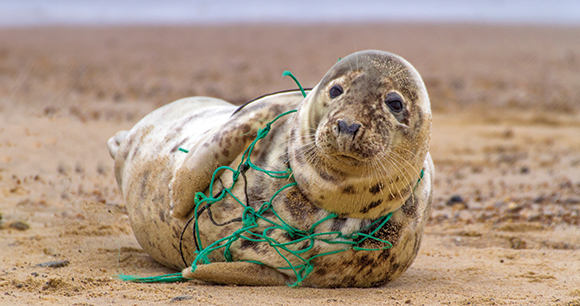The United States imports approximately 70 to 85 percent of the seafood Americans consume—more than 6.1 billion pounds each year, nearly half of which is wild-caught. These finfish and shellfish are harvested from all around the world and imported into the lucrative US market from approximately 130 nations. Far too often, this influx of seafood comes at a great cost to marine mammals.

Each year around the world, more than 650,000 dolphins, whales, seals, and other marine mammals die or are seriously injured in fishing gear. Ensnared in nets, entangled in fishing lines, or snagged on fishing hooks, these animals are “bycatch”—collateral damage, as it were—of commercial fisheries targeting swordfish, tuna, other finfish, shrimp, lobster, and crab. Bycatch poses the single greatest threat to marine animals both in terms of welfare and species conservation.
Most marine mammals swept up as bycatch die—either drowning at the point of entanglement or dying onboard before being tossed aside. Those who initially “escape” entanglement may experience serious abrasions, cuts, broken bones, and even amputations. Suffering for these animals can be prolonged, with some animals dying weeks or months after the encounter.
Under the Marine Mammal Protection Act (MMPA), enacted in 1972, US fisheries are required to meet certain delineated standards that are designed to minimize bycatch of marine mammals. Foreign fisheries wishing to enter the US market must operate under similar bycatch prevention standards. Specifically, the MMPA requires the US government to “ban the importation of commercial fish or products from fish which have been caught with commercial fishing technology which results in the incidental kill or incidental serious injury of ocean mammals in excess of United States standards.”
Yet for over 50 years, the United States has, by and large, ignored this requirement. AWI and partner organizations, the Center for Biological Diversity and the Natural Resources Defense Council, have been leading the charge to get the National Marine Fisheries Service (NMFS) to follow the MMPA’s mandate to prohibit seafood imports from foreign fisheries with subpar marine mammal protection standards.
With the 2016 adoption of “MMPA Import Provision” regulations, NMFS finally began taking the necessary steps to implement this critical component of the law. These regulations require foreign fisheries to provide evidence that their bycatch prevention standards measure up: Importing nations must apply for and obtain from NMFS a “comparability finding”—a determination that their standards compare favorably to the standards imposed on US fisheries under the MMPA.
However, in order to provide such nations with additional time to assess marine mammal stocks, estimate bycatch, and develop regulatory programs that mitigate that bycatch, the MMPA Import Provision regulations provided a five-year exemption period, after which NMFS was supposed to determine which foreign fisheries met US standards.
Rather than adhere to this deadline, however, NMFS has granted itself three extensions to make its determinations, with the result that implementation of this vitally important rule has now been delayed until January 1, 2026. In its November 2023 notice announcing the most recent delay, the agency indicated it may also substantively amend the Import Provision regulations.
In the meantime, AWI and its partners have sought to learn as much as possible about the information NMFS currently possesses pertaining to its evaluation of foreign standards. On February 24, 2022, we submitted a Freedom of Information Act (FOIA) request seeking comparability finding applications purportedly submitted to NMFS by the governments of Canada, Ecuador, Fiji, France, India, Indonesia, Mexico, Norway, South Africa, South Korea, and the United Kingdom.
Well past the statutory due date, NMFS provided five interim, ultimately incomplete releases of records, unlawfully withholding or redacting more than 600 records. NMFS asserted a number of exemptions to justify its withholding or redactions, including those related to privileged or confidential commercial or financial information, individual personal privacy, and interference with enforcement proceedings, which do not actually apply to the records sought. Further, NMFS failed to provide other documents responsive to the FOIA request. On February 23, 2023, AWI and partners filed an administrative appeal of NMFS’s response to the FOIA request, to which NMFS failed to respond.
Thus, on April 4, 2024, AWI and partners sued NMFS under FOIA in the US District Court for the Southern District of New York over the agency’s inadequate response to our request for materials pertaining to the import rule. Our lawsuit asks the court to find that NMFS’s failure to timely respond to the administrative appeal was unlawful and to order NMFS to promptly provide us with all records responsive to the FOIA request.
Compelling NMFS to release these documents will allow us to gain greater insight into the information the agency has received from foreign fisheries for the purpose of making comparability findings—that is, determining whether the efforts of these nations to prevent marine mammal bycatch are sufficient to justify access to the US seafood market.